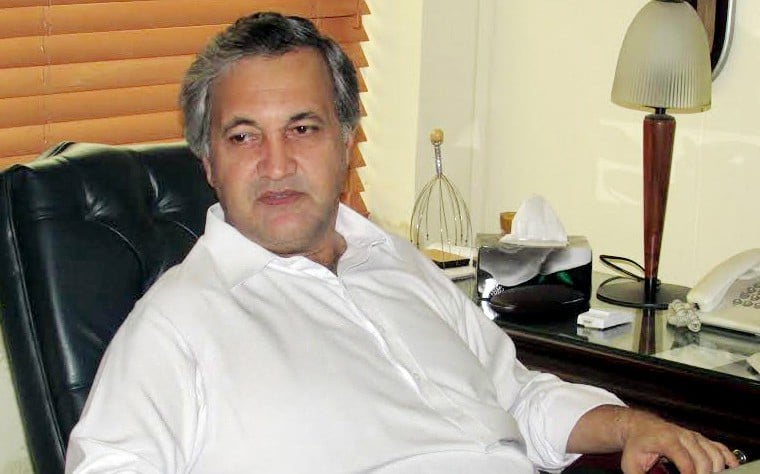
Hamidullah Jan Afridi on the various options for the political future of Fata

The News on Sunday: When did you start politics?
Hamidullah Jan Afridi: I was elected as senator in 2003.Then, on the demand of the NA-46 voters, I contested general elections and was elected as Member of the National Assembly in February 2008. I was lucky that the PPP-led government took me as federal minister for environment.
TNS: Why do you oppose Fata’s bill in the National Assembly?
HJA: I oppose the bill as it has been prepared without consultations with tribal people. Four MNAs who had no knowledge about Pata tabled the bill. NA-45 MNA, Sajid Turi and two Bajuar Agency MNAs have no right to decide without consulting with the people of Fata. These parliamentarians have no mandate to decide without taking 10 million tribal people on board. 1.7 million voters are registered while only 0.1 million votes had been polled in the 2013 elections in Fata. The people of Pata are also struggling for their rights.
TNS: When did you start your struggle for the rights of Fata people?
HJA: I started struggle for Fata people’s rights in 2004 when I formed "Fata grand alliance" I included all schools of thoughts in it so that everyone had their say in the political movement. We started raising voice for peace in Fata.
TNS: What could be the possible drawback if Fata is merged into Pata?
HJA: I met Shahjee Gul Afridi and Sajid Turi and asked them about positive aspects of Pata but they had no answer, except only that they wanted to get rid of the Centre. The real problem is that Pata MPAs have no legal right to legislate in the Provincial Assembly. Fata is economically backward, depending on the Centre or donor agencies. Most of the infrastructure is either outdated or destroyed and needs costly rehabilitation. I think it would not be possible to do all these on our own resources. If Fata is merged into the provincial government it will stop Fata’s annual budget which is a huge amount and tribal people would lose their voice in the Upper House as Fata has eight seats in the Senate. I think it will be living in a fool’s paradise to say that life will move in the right direction if Fata is merged into KP. It is on record that none of the political parties raised a sincere voice for Fata in the past governments. Political parties use Fata as a political card.
TNS: What can be the best way to know what the people of Fata want?
HJA: If all the political parties say that the Kashmir dispute must be resolved in the light of what Kashmiris want why can the same formula be not applied to Fata? The best way I think is a ballot or referendum to know what tribal people want. My personal suggestion is if there is a hurdle in making Fata a separate province, it should be given an elected council with full mandate so that they can change their future. When an independent Fata council gets elected they will decide what they want.
Read also: "We are united in support of our 7-point charter of demands," says Shahjee Gul Afridi
TNS: Does this parliament have the legal authority to change Fata’s status and merge it into KP?
HJA: The current parliament can make laws, not constitution. It has no authority to bring change in the constitutional framework. It is possible only when all the parliamentarians go to their constituencies and contest elections with the specific point that they want to bring change in the constitution as it was done in the 1970s.
TNS: If you are an MNA what should be your stance about the bill presented in the parliament?
HJA: If I am an MNA I will not take up the bill in parliament as it doesn’t need a constitutional amendment. Article 247 of the constitution bars the parliament to change Fata’s status but it is on the discretion of the president to change Fata’s status.
TNS: What future do you see for Fata if it is not merged into KP?
HJA: Fata has a bright future as it is connected with Central Asia. We are linked with Pak-China Corridor which would generate a large number of businesses and economical opportunities in future.
We do want some necessary changes in the Frontier Crimes Regulations so that political agent’s authority could be decentralised. We are not ready to afford change in the tribal tradition and culture. Tribals are not ready to accept police and Patwari system in Fata. We are not satisfied with the justice system in the settled areas. If the tribal system is changed without taking into account the aspirations of tribal people, it would be resisted. Although I am a democratic person and I respect what 10 million Fata people want.
Those who say that FCR is the root cause of backwardness are totally wrong. We saw militancy in Pata from where big militants emerged. But political agents I think are the bone of contention who should mostly be held responsible for the uncertainty, lawlessness and poor development projects due to the corruption and unique nature of powers. Fata’s major problem is the lack of good governance.